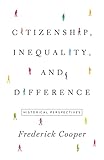Citizenship, Inequality, and Difference : Historical Perspectives / Frederick Cooper.
Material type: TextSeries: The Lawrence Stone Lectures ; 9Publisher: Princeton, NJ : Princeton University Press, [2018]Copyright date: ©2018Description: 1 online resource (224 p.) : 5 b/w illusContent type:
TextSeries: The Lawrence Stone Lectures ; 9Publisher: Princeton, NJ : Princeton University Press, [2018]Copyright date: ©2018Description: 1 online resource (224 p.) : 5 b/w illusContent type: - 9780691171845
- 9781400890422
- 323.6 23
- JF801 .C667 2018
- online - DeGruyter
- Issued also in print.
| Item type | Current library | Call number | URL | Status | Notes | Barcode | |
|---|---|---|---|---|---|---|---|
 eBook
eBook
|
Biblioteca "Angelicum" Pont. Univ. S.Tommaso d'Aquino Nuvola online | online - DeGruyter (Browse shelf(Opens below)) | Online access | Not for loan (Accesso limitato) | Accesso per gli utenti autorizzati / Access for authorized users | (dgr)9781400890422 |
Browsing Biblioteca "Angelicum" Pont. Univ. S.Tommaso d'Aquino shelves, Shelving location: Nuvola online Close shelf browser (Hides shelf browser)

|

|

|

|

|

|

|
||
| online - DeGruyter American Default : The Untold Story of FDR, the Supreme Court, and the Battle over Gold / | online - DeGruyter The Analects : An Illustrated Edition / | online - DeGruyter The Manhattan Nobody Knows : An Urban Walking Guide / | online - DeGruyter Citizenship, Inequality, and Difference : Historical Perspectives / | online - DeGruyter What Is the Present? : A History of the Here and Now / | online - DeGruyter The Autobiography of Solomon Maimon : The Complete Translation / | online - DeGruyter Writing on the Wall : Graffiti and the Forgotten Jews of Antiquity / |
Frontmatter -- Contents -- Preface -- Introduction. Citizenship and Belonging -- Chapter one. Imperial Citizenship from the Roman Republic to the Edict of Caracalla -- Chapter two. Citizenship and Empire - Europe and Beyond -- Chapter three. Empires, Nations, and Citizenship in the Twentieth Century -- Conclusion. Citizenship in an Unequal World -- Notes -- Index
restricted access online access with authorization star
http://purl.org/coar/access_right/c_16ec
A succinct and comprehensive history of the development of citizenship from the Roman Empire to the present dayCitizenship, Inequality, and Difference offers a concise and sweeping overview of citizenship's complex evolution, from ancient Rome to the present. Political leaders and thinkers still debate, as they did in Republican Rome, whether the presumed equivalence of citizens is compatible with cultural diversity and economic inequality. Frederick Cooper presents citizenship as "claim-making"--the assertion of rights in a political entity. What those rights should be and to whom they should apply have long been subjects for discussion and political mobilization, while the kind of political entity in which claims and counterclaims have been made has varied over time and space. Citizenship ideas were first shaped in the context of empires. The relationship of citizenship to "nation" and "empire" was hotly debated after the revolutions in France and the Americas, and claims to "imperial citizenship" continued to be made in the mid-twentieth century. Cooper examines struggles over citizenship in the Spanish, French, British, Ottoman, Russian, Soviet, and American empires, and he explains the reconfiguration of citizenship questions after the collapse of empires in Africa and India. He explores the tension today between individualistic and social conceptions of citizenship, as well as between citizenship as an exclusionary notion and flexible and multinational conceptions of citizenship. Citizenship, Inequality, and Difference is a historically based reflection on some of the most fundamental issues facing human societies in the past and present.
Issued also in print.
Mode of access: Internet via World Wide Web.
In English.
Description based on online resource; title from PDF title page (publisher's Web site, viewed 27. Sep 2021)


